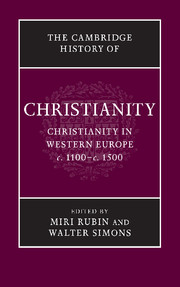Book contents
- Frontmatter
- Introduction
- PART I INSTITUTIONS AND CHANGE: 1100–1200
- PART II FORGING A CHRISTIAN WORLD, 1200–1300
- 5 The theological framework
- 6 The legal underpinnings
- 7 Material support I: parishes
- 8 Material support II: religious orders
- 9 The Word and its diffusion
- PART III THE ERECTION OF BOUNDARIES
- PART IV SHAPES OF A CHRISTIAN WORLD
- PART V CHRISTIAN LIFE IN MOVEMENT
- PART VI THE CHALLENGES TO A CHRISTIAN SOCIETY
- PART VII REFORM AND RENEWAL
- Select bibliography
- Index
- Map 1 Western Europe c. 1100 – c. 1500
- Map 2 Universities of Europe
- References
9 - The Word and its diffusion
from PART II - FORGING A CHRISTIAN WORLD, 1200–1300
Published online by Cambridge University Press: 28 March 2010
- Frontmatter
- Introduction
- PART I INSTITUTIONS AND CHANGE: 1100–1200
- PART II FORGING A CHRISTIAN WORLD, 1200–1300
- 5 The theological framework
- 6 The legal underpinnings
- 7 Material support I: parishes
- 8 Material support II: religious orders
- 9 The Word and its diffusion
- PART III THE ERECTION OF BOUNDARIES
- PART IV SHAPES OF A CHRISTIAN WORLD
- PART V CHRISTIAN LIFE IN MOVEMENT
- PART VI THE CHALLENGES TO A CHRISTIAN SOCIETY
- PART VII REFORM AND RENEWAL
- Select bibliography
- Index
- Map 1 Western Europe c. 1100 – c. 1500
- Map 2 Universities of Europe
- References
Summary
In his Ars Praedicatoria, written in the closing decades of the twelfth century, Alan of Lille (c. 1128–1202) summed up the parts of preaching thus: ‘preaching is an open and public instruction in behaviour and faith, the origin of which derives from the path of reason and from the wellspring of the “authorities”, the purpose of which is the formation of human persons’. As distinct from teaching conducted privately, preaching was a discourse performed publicly, the basis of which was authoritative sources, guided by holy Scripture, which aimed to instill right belief and moral practice in the Christian faithful. Alan’s treatise was one of the first salvos fired in a revolution that was to transform the mode in which preaching was delivered to the people in the medieval period. That is, from the twelfth century the art of preaching was fundamentally reconceived, reconfigured and retooled to confront the challenges of a changing world. Adopting a new style called the ‘modern sermon’, preaching now broached new subjects, and gave rise to a new literature to aid in sermon composition. This new literature was produced in mass quantities to meet the demands of a new professional class of preachers – the friars – who now joined the bishops in bearing the ‘good news’ to far-flung audiences from Cork all the way to Cathay. Audiences themselves also contributed to the sea-change in the history of preaching.
Keywords
- Type
- Chapter
- Information
- The Cambridge History of Christianity , pp. 114 - 132Publisher: Cambridge University PressPrint publication year: 2009
References
- 1
- Cited by

